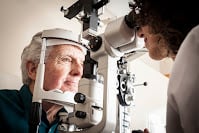Patients who undergo heart valve surgery are at a heightened risk of cognitive decline in the first...
Cataract Surgery Linked to Lower Dementia Risk in Older Adults

Older adults who undergo cataract surgery are at lower risk of developing dementia compared with those who do not undergo surgery, reports a study published today in JAMA Internal Medicine. A similar effect was not observed in older adults who received surgery for glaucoma.
“These results have implications for the care of older persons who are uniquely at higher risk for both impaired vision due to cataract and impaired cognition due to neurodegeneration observed in age-related dementia,” wrote Cecilia S. Lee, M.D., M.S., of the University of Washington and colleagues. “Given the substantial degree by which cataract extraction is associated with lower risk of dementia and its persistent effect beyond 10 years, the improvement in quality of life for the affected individuals and their [families] is likely considerable.”
Lee and colleagues assessed data from the Adult Changes in Thought study, an ongoing longitudinal study that monitors the cognitive health of adults 65 and older who are members of Kaiser Permanente Washington. From this sample, they identified 3,038 adults who received a cataract diagnosis before the onset of any dementia; 1,382 underwent cataract surgery and 1,656 did not. The researchers tracked the outcomes of the study participants from the moment of cataract diagnosis until death, study dropout, or their most recent clinical visit.
In total, 853 adults developed dementia during the follow-up. After adjusting for numerous variables (including patient health, as healthier patients at lower risk of dementia might be more willing to undergo surgery), the researchers found that adults who underwent cataract surgery had a 29% reduced risk of dementia compared with those who did not. The reduction was greatest during the first five years after surgery (32% reduced risk), but was maintained more than five years after surgery, the authors noted.
Lee and colleagues conducted a similar assessment using data from 728 adults who received a glaucoma diagnosis before dementia onset. In this population, they found no reduced risk of dementia among the 105 adults who underwent glaucoma surgery.
“Several hypothesized mechanisms may underlie the association between cataract extraction and dementia risk,” Lee and colleagues wrote. “Visual impairment may lead to psychosocial difficulties, withdrawal from social interactions, and reduction in activity or exercise, all of which are associated with cognitive decline. Cataract-related visual impairment may decrease neuronal input, potentially accelerating neurodegeneration or magnifying the effect of neurodegeneration through cortical atrophy. … Finally, compensation for visual input deficit may increase cognitive load and exacerbate cognitive decline.”
For related information, see the Psychiatric News article “Retinal Thickness May Be a Cognitive Biomarker.”
(Image: iStock/Bill Oxford)
Don’t Miss Your Chance to Submit Ideas for 2022 Annual Meeting Posters
Submit your ideas for new research posters for the 2022 APA Annual Meeting, to be held May 21 to 25 in New Orleans, by Thursday, December 9. The theme of the meeting is “Social Determinants of Mental Health.” To be considered, all abstracts must be submitted through APA’s online abstract submission system.





